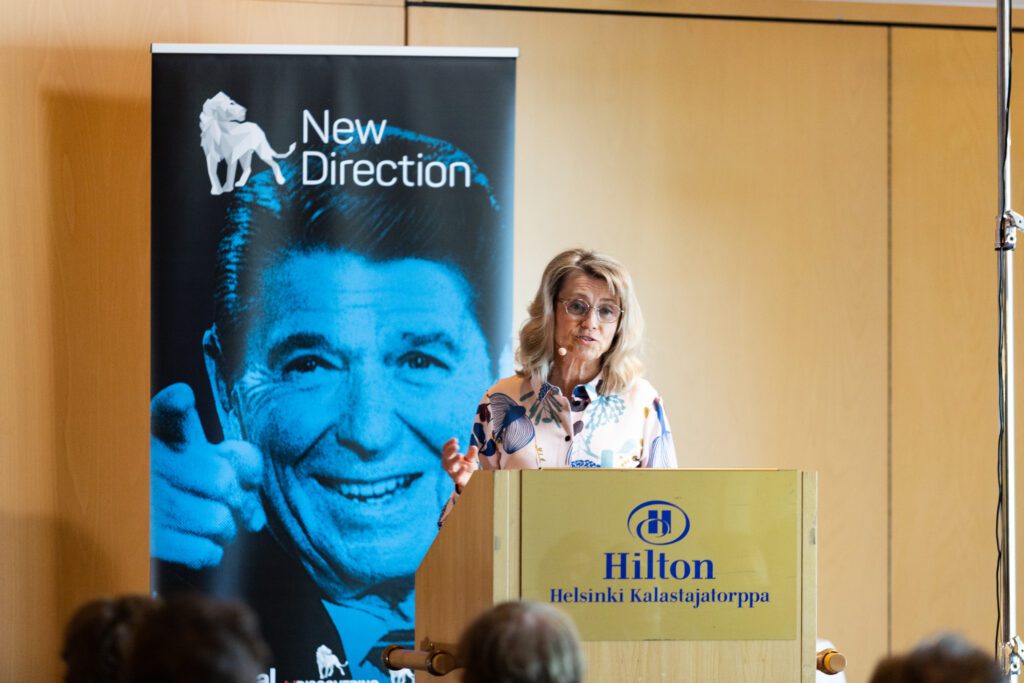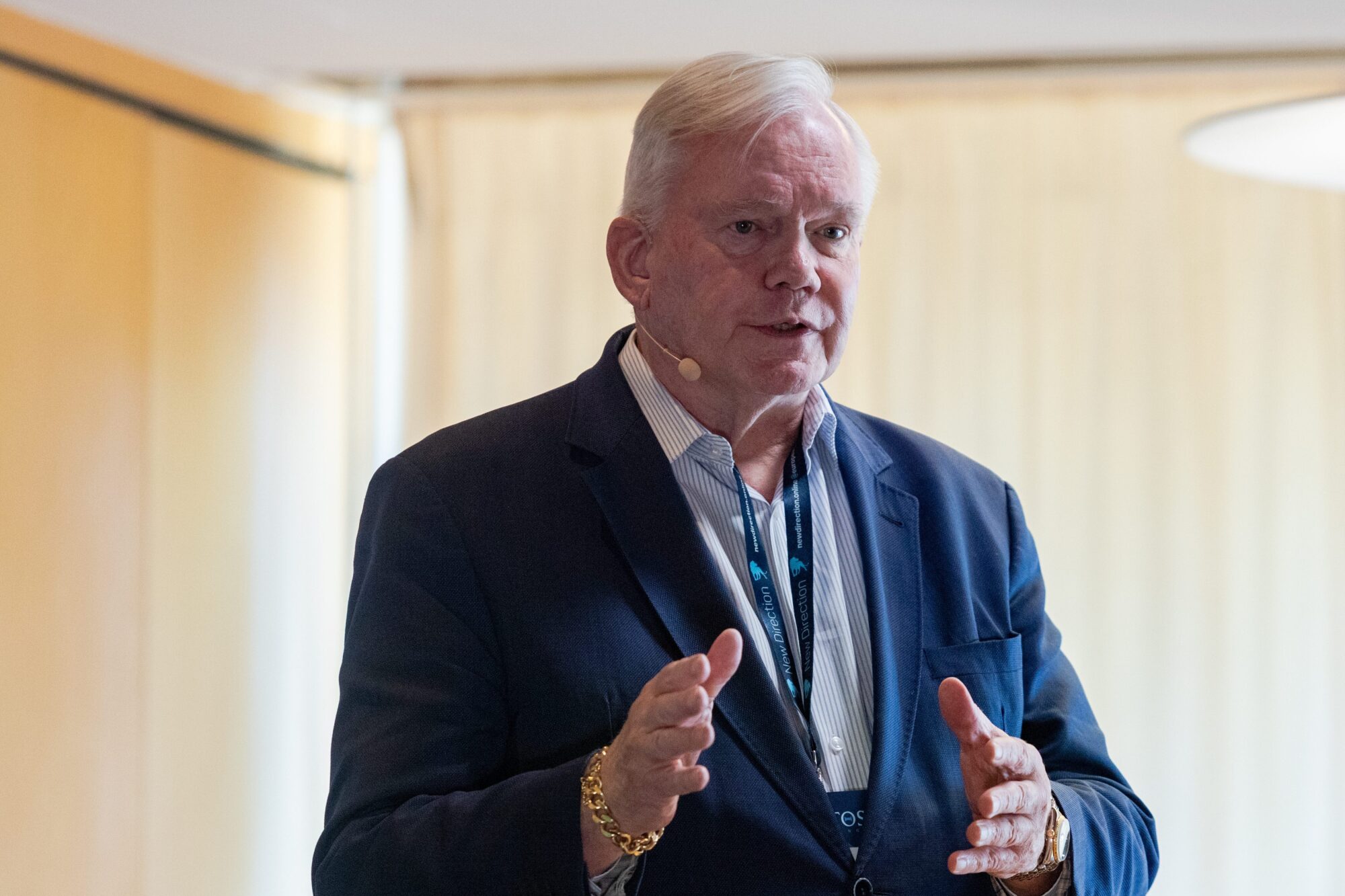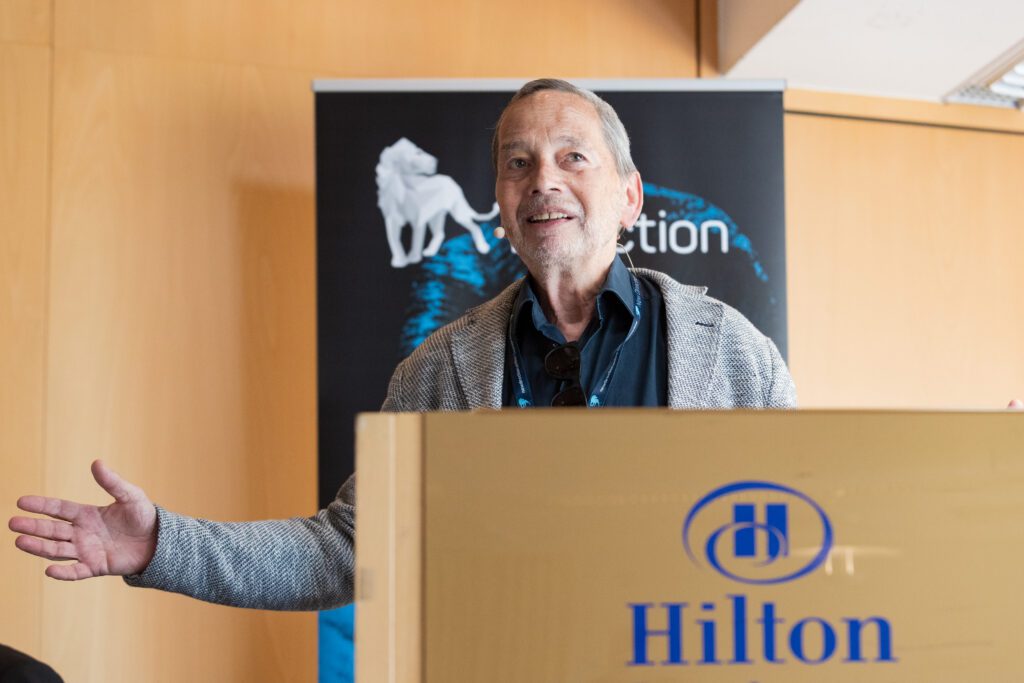Attempting to expound someone else’s thought is always a high-risk endeavor. But since I recently declared Dalmacio Negro Pavón the most significant political thinker in Spain in recent decades, with all due caution, I will outline what I consider to be some of the interpretive keys to Negro Pavón’s thought.
The hotel on the outskirts of the city was bathed in glittering, pale, distinctly Nordic sunlight for the entirety of the Nostos II conference in Helsinki; white-stemmed beech trees surrounded the grandiose Moomin-like hall in which the gala dinner at the end of the conference would be held. Next to the Moomin House—a tribute to a beloved Scandinavian fairy tale by Finnish author Tove Janssen—in a hall with windows overlooking one of the great Finnish gulfs entering the Baltic sea, the opening remarks kicking off the conference would soon commence.
The guests of the conference were many, but the variety amongst the attendees was remarkable: architects, writers, political commentators, former and current politicians, historians, students, philosophers, professors, activists, as well interested lay persons. The anticipatory glow before the opening remarks was evident amongst the visitors and guests, seated in the plush marine-blue hotel chairs as they were. Without a clear feeling of what the take away would be this time around, the excitement could be described as a certain background mood of joy, as it is not often that diverse members of the Nordic countries gather in order to devise an account of the unique nature of Nordic conservatism. The description of the event, presented on the website of one of the main sponsors, read:
Nordic conservatism is in a renaissance, with new ideas and beliefs emerging to support the old. Chief amongst them is the debate over the foundations and fundamentals underpinning free society. Nordic countries are at the forefront of this debate over the balance of freedom and responsibility in both government and civil society—balancing the role of the state with that of the individual. For many, this freedom is under renewed pressure with the rise of a radical counter cultures in society.
Last year, at Oslo’s conference, all the Nordic countries except for Denmark were represented—Sweden, Norway, Iceland, and Finland. At this year’s conference, however, this was all rectified as Denmark was present, as well as representatives from Hungary and Estonia.
The title of the conference was simply “Nostos II, ”inspired by the ancient Greek theme of homecoming, essential to two of the canonized epics of the Western world, namely Homer’s The Iliad and The Odyssey. The heroes Odysseus, Menelaus, and Nestor—from whom the concept is named—all recount their stories of journeying home from the decade-long war across the Aegean sea. ‘Nostalgic’ denotes a “longing for or thinking fondly of a past time or condition,” or an emotion that is “evocative of a longed-for past time or condition.” Likewise, the noun refers to “someone who longs for a past time or condition: a person given to nostalgia.”
Indeed, conservatives are often accused of entertaining the naïve idea of returning to a glorious past when things were ‘better.’ After all, the past is as much a reconstruction of present needs as the future is a projection of our wants and fears—or so progressive ideology would claim. Yet, as recent cognitive science has shown (and perennial traditions would corroborate), the ability to imagine a future depends on having a conception of and appreciation for the past.
So, what is Nordic Conservatism? What, if anything, binds Scandinavia and the Nordic countries together? And what can Nordic conservatism contribute to the contemporary political climate?
Few could fully anticipate the exact turn of events that would lead Sweden—traditionally the most neutral country in Scandinavia in particular and in Northern Europe in general—to officially apply for NATO membership earlier this spring. Of course, the war waged against Ukraine by Russia was a pivotal and necessary event. The only country lying between Sweden and the behemoth to the east is Finland, with Estonia lying along the same border south of the Gulf of Finland.
Recently, during the writing of this article, on August 4, Norway was added to Russia’s list of “unfriendly states,” due to its support of Ukraine. This listing restricts Norway’s diplomatic relations with Russia. Among other things, this was in response to Norway’s economic sanctions against Russia, which it deployed in imitation of the European Union’s strategy against Putin, despite not being a member state.
In these times of conflict, there is no obvious political solution to the many problems besetting Europe. The world holds its breath while China is joining the peace talks on resolving the conflict in between Russia and Ukraine, and the Nordic countries bordering Russia are troubled. Apart from that, the Nordics appear to be, relatively speaking (compared with more central parts of Europe), politically stable, uncorrupted, and balanced—or are they?
Russia’s War on Ukraine is simply the most concrete example of the chaos faced not only by Europe, but by the whole Western world, which is beset with inner cultural turmoil within national borders.
Concerned as we all are about the upcoming 2024 elections in the U.S., talk of crises on both the Left and the Right is being imported to Europe. And just as the citizens of, say, Norway (my country of origin) might claim to have faith in individual politicians and the political process in general, politicians of the Left and Right are stepping down due to their own illegitimate conduct.
The political ‘summer of crisis’ in Norway began when Minister of Culture and Equality Annette Trettebergstuen was accused of unlawful nepotism, having placed close friends in political positions of power. She admitted the misconduct and stepped down from office. Later in the summer, the popular leader of the far-left party Rødt—the most influential socialist party in Norway—was caught on camera shoplifting a pair of sunglasses from Gardermoen airport. His dishonesty in the wake of the shoplifting (he returned the glasses while still at the airport) was considered worse than the shoplifting itself and—after several successful years—he was finally replaced as leader. Finally, the Minister of Research and Higher Education Ola Borten Moe, of the centrist party, was revealed to be shareholder in a weapons production company. In a time when one of the most controversial foreign policy issues in Norway revolves around whether or not to supply Ukraine with weapons, Borten Moe’s revelation had dire consequences, and he too had to step down. Thus, during this past summer alone, the Norwegian political landscape changed a bit on the surface—though perhaps the changes in the hearts and minds of the Norwegian populace were greater.
In Sweden, a recurring problem has been the integration of its large immigrant population. ‘Paris-style’ suburban centers have suffered from high crime rates, and proposed solutions have been either ineffective or nigh non-existent. As most conservative-oriented observers in Sweden could attest, the progressive Left has radically underestimated the nation’s ability to properly cope with cultural differences. A violent protest of Ethiopian emigres against a pro-Eritrean theme park outside of Stockholm, recent Quran burnings in Denmark, and similar conflicts in the other Scandinavian countries, have once more brought the question of immigration back to the forefront.
Whereas the Left has been seen as sidestepping, circumventing, or simply ignoring the question of cultural differences, the Right has stepped up with several paradoxically liberal voices defending the freedom of speech (without defending the Quran violators) and other values (often taken for granted), which they uphold as indispensable to Western identity. And with that, the question of identity as such is once more back: what is a Scandinavian identity? And in what does a Scandinavian or Nordic value system consist?
It is with this backdrop that New Direction’s Nostos conference was held for the second time, this time in Helsinki, well before the aforementioned turmoil manifested itself as riots and burning during the summer.
After organizer Petter Kirkeholmen expressed his gratitude to the conservative student organization FAKS for hosting the event (the fact that the whole thing is put together by a student organization is quite remarkable), Witold d’Humilly de Chevilly—executive director of the Thatcher-founded organization New Direction—kicked it off by providing more information about the conference’s themes.
Last year’s conference was mainly dedicated to some of the areas considered to be Sir Roger Scruton’s legacy. (Indeed, Nostos last year was in part funded by the Roger Scruton Legacy Foundation.) These included areas such as architecture, the environment, and love and sexuality. This year focused more on the question of liberty and freedom.
As Chevilly said in his introductory speech, since New Direction is partly supported by the European Parliament, the dilemma of balancing politics with idealistic think-tank activity is always a challenge. That said, he also stated last year’s conference in Oslo was one of the most successful conferences New Direction has ever had.
The first keynote speaker to address the audience was none other than former Finnish minister of the interior, Päivi Räsänen. She began by informing the audience that the Christian Democratic Party—her own party when she was MP—was indeed involved with negotiations for the new conservative government in Finland. She continued with a comment on the basic freedoms now threatened by the neighboring countries to the East, and she stated that the Finns sympathize with the Ukrainians on account of their shared history of conflict with the former Russian Empire and Soviet Union.

She then reminded her audience that one of the hallmarks of the Nordic countries is their high ranking in freedom polls and poll measuring political and social liberty, as well as happiness (Finns have consistently been ranked as one of the happiest peoples on Earth at several occasions). This now seems to have changed, however. Räsänen herself was criminally charged for posting a Bible quote on her Twitter. What followed was a veritable witch hunt against Räsänen for her conservative Christian beliefs—beliefs that until recently were protected by one of the fundamental freedoms of democracy, namely freedom of belief and freedom of expression.
One of the main takeaways from Räsänen’s speech was that the surprising hostility exhibited towards Christians in recent years is due—amongst other reasons—to a rise in radical political ideologies. According to Räsänen, we would do well to remember that the Christian worldview helped to build so many of the institutions, norms, and values that we take for granted, not just in the Nordics but in Western democracies in general.
The first panel continued with some of the themes presented by the former Finnish MP. Robert Tyler, senior political advisor for New Direction, said: “The border between the free and the unfree world goes between Finnland and Russia.” Mahmoud Fahramand, politician for the Høyre—the conservative party in Norway—followed up with a speech on what makes the Nordic countries similar and good. Mikkel Bjørn Sørensen, MP for the Danish Peoples Party, gave a presentation on the future of the culture wars. Estonian professor of economics, Hardo Pejula, had a somewhat more eclectic choice of topics, as he led the audience through his own search for meaning via several writers, such as Roger Scruton, Jordan Peterson, and Rupert Sheldrake, who all regard religious experience as a fundamental source of meaning in a world that is falling apart.
This somewhat personal and heartfelt focus on the theoretical fundamentals of human experience was a welcomed contrast to the otherwise real-political themes of the conference. The panel discussion that followed, ranged over many topics. Fahramand concluded with the remark that a certain victim culture, tied to the political Left, is sapping hope from the youth, and that it is up to conservatives to stop this.
The panel that followed, included Fahramand’s colleague, the Member of Parliament Anna Molberg and economist Christian Anton Smedshaug. They discussed sovereignty, security, and what makes a society thrive. One of Fahramand’s main conservative points regarding national security is that the military concept of the willingness to use violence, implies values to supply the inner motivation for its execution: values like, indeed, the freedom of belief and the freedom of expression. Fahramand himself, originally comes from Iran, and should know a thing or two about this. Smedshaug followed this line of reasoning, and said that we can’t simply fund the military, without a clear idea of what it is that we defend. And that is not just national borders, but values.

The next panel was perhaps the most intellectually and historically heavy one, with Icelandic professor Hannes Gissurarson leading the way. The extraordinary story of Nordic conservatism is traced back to the Viking age, when several laws were established with the aim of protecting the people from the increased power of kings and empires. Gissurarson mentioned the remarkable cohesion of civil society that all the Nordic countries have shared since time immemorial. Jacob Söderbaum followed up with a critical speech on the lengthy tenure of the social in power, such that one might even claim that they had taken over Sweden.
Once again, one could observe a certain tension in the conference; where some commentators wanted to take the discussion of the crisis of culture further and weigh the radical promise of conservatism more heavily, others wanted a more balanced and optimistic approach.
Frank Furedi, a Hungarian-Canadian academic and emeritus professor of sociology at the University of Kent and MCC Brussels, was the first speaker in the panel on academic freedom in contemporary society. Furedi spoke of how the shift had gone from the raw, classical, and direct style of education, with the Socratic method of barraging follow up questions to the student, to nearly the complete opposite in his time of teaching. He also discussed how the universities now suffer from an insidious “presentism,” with a lack of historical focus and knowledge.

In the golden days, Furedi explained, pedagogy was driven by philosophy and theology, whereas now it is driven by—who knows what? If the people that run the educational systems, Furedi claimed, do not view education as an absolute good in itself, then academic freedom is suddenly not viewed as important either. Quoting Hannah Arendt—Furedi’s favorite political philosopher—he said that education is a transfer of past ideas into the present, and this, the professor continued, encourages ideas that can lead to new experiences. We need a new conservative renaissance, a renaissance in the true sense of the word, Furedi concluded.
The final panel was dedicated to the question of the very materiality of conservatism, namely architecture, thus rounding out a highly stimulating and intellectually wide-ranging conference. Overall, Nostos II was a hopeful sign for the future of Nordic conservatism.
All event photos in this essay © Julie Brundtland.